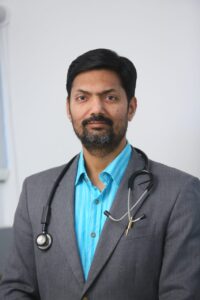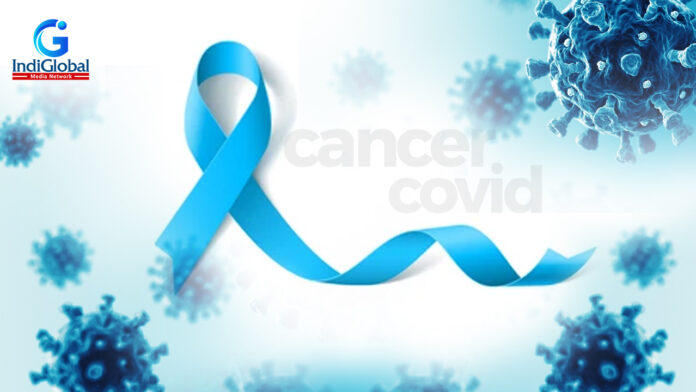Kaniza Garari
IndiGlobal Media Bureau
Cancer care and treatment was sought only as an emergency during the last two years of the pandemic as people were scared to visit hospitals for the fear of contracting Covid 19 infection.
Due to this reason, detection of cancers was in advanced stages. In men, cancers of lung and prostrate has seen a rise and in women it is cancers of breast and uterus.
 Despite there being several awareness campaigns, the locally advanced cancers in these organs are still seeing late detection. Pandemic made it worse as clinical diagnosis was hampered due to the several restrictions of lockdown and containment that led to cancers coming to the emergency section for treatment.
Despite there being several awareness campaigns, the locally advanced cancers in these organs are still seeing late detection. Pandemic made it worse as clinical diagnosis was hampered due to the several restrictions of lockdown and containment that led to cancers coming to the emergency section for treatment.
Cancer specialists state that they found many reasons for not visiting clinics and also a drop in consultations after lockdown:
- Non-specific symptoms of cancers led to individuals opting for safety at home rather than contracting Covid 19 while commuting or at a healthcare setting.
- Cancer patients were not sure about non-Covid 19 related healthcare services
- A major communication gap has been noted in reaching out to them and also convincing them about safety
- Diagnostics was a challenge due to fear of contracting Covid 19
- Temporary halt in services in the lockdowns led to a breakdown in screening programs and also created a mindset to not visit hospitals as they would contract Covid 19
- Immune-compromised state of patients after surgery and chemotherapy led to Covid 19 infection which sent a message that hospitals were not safe. But those at home had their symptoms worsen and cancers advanced.
Clinical reports from Cancer Institutes continue to show fewer out-patient consultations and admissions for treatment even after two years.
It was believed that in 2022, the patients would have confidence to come back but with Omicron variant patients are still reluctant for physical consultations. The e-medical consultations in cancers have been a challenge as diagnosis and physical examination is not possible.
This delay in early consultations and follow-up consultations for identified cancers is negatively influencing cancer detection and also increasing the burden of tumours. It is also negatively affecting the overall outcomes of quality of life in patients with any form of cancer.
 Dr P Vijay Anand Reddy, Director, Apollo Cancer Institute, Hyderabad says, “Treating patients in the last two years has been tough. Patients undergoing chemotherapy had many issues as the management of their side-effects and other problems was a challenge. A significant number of patients were lost because of Covid 19, post chemotherapy. There were issues post-surgery but less compared to post chemotherapy. Surgery patients took long time to recover. The patients who underwent radiation therapy did not have much of a problem.”
Dr P Vijay Anand Reddy, Director, Apollo Cancer Institute, Hyderabad says, “Treating patients in the last two years has been tough. Patients undergoing chemotherapy had many issues as the management of their side-effects and other problems was a challenge. A significant number of patients were lost because of Covid 19, post chemotherapy. There were issues post-surgery but less compared to post chemotherapy. Surgery patients took long time to recover. The patients who underwent radiation therapy did not have much of a problem.”
Problems countered were in terms of management of side-effects, Covid 19 infection and follow-up care. These led to a drastic tilt as the achievements of early detection of cancers, regular follow-ups and supportive care in terms of nutrition and therapy could not be provided to many patients.
Those who contracted Covid 19 were found to suffer from Long Covid which further compromised their condition and treatment of cancer.
While World Health Organisations Globocan 2020 states that there were nearly 8,00,000 deaths in India due to cancer. Those who died from cancer and Covid 19 are yet to be recorded. Clinical numbers are the only means of retrieving data to give an account of the impact.
 With the Third Wave finally declining oncologists state that healthcare system now needs to restore normalcy and provide the confidence in visiting hospitals.
With the Third Wave finally declining oncologists state that healthcare system now needs to restore normalcy and provide the confidence in visiting hospitals.
Dr Palanki Satya Dattatreya Director and Chief Of Medical Oncology Services, Renova Soumya Centre, Secunderabad says, “Those who have suspicious symptoms need to be encouraged to consult so that the diagnosis can be done early. There is also a need for the medical fraternity to guide the policy makers for designing and delivering cancer awareness programs in the wake of Covid 19. The need is to follow-up and get back to the screening schedules which will help to identify early and provide better care.”








